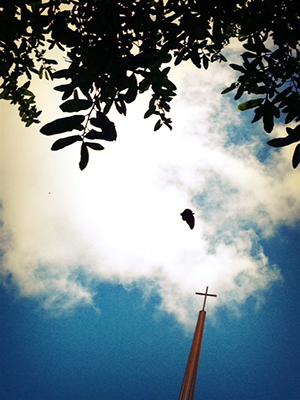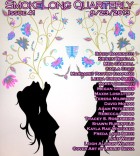I came to Sally’s communion party because I thought an open bar would be guaranteed at a Catholic affair but by the second hour, I am stone sober, covered in egg yolk, and helping a 10-year-old fish lethargic frogs out of the pool filter for the “hippety hop race.” I name Sally’s three-legged, chlorine-bleached frog Bukowski because I suspect he guzzled some pretty strong spirits on pool cleaning day.
“His name is Brownski?” Sally asks, and I don’t have the heart to correct her.
Uncle John leans over from his spot in the plastic lawn chair to ask whether Brownski is a Jewish name, and have I gone and handed Sally a Jewish frog on her communion day?
I ignore him and head to the kitchen where I hope to find a stray bottle of vodka, but instead find Aunt Janet who takes one look at the remnants of the egg toss splattered all down my front and tugs my sweater up over my stomach.
“Aunt Janet, buy me dinner first,” I say, holding up my hands.
“Very funny girl,” she says, her face beatific and somber yet judgmental in a way that seems studied from the statues outside my grade school. “I’m just going to soak this in some tide.” She pulls the sweater over my head and I yank at the hem of my undershirt that threatens to come off with it. Her touch is soft, as if mine is just another shell she might break in the handling.
There is a card on the counter with a squiggle of ink across the top, like someone used it to test a faulty pen. When I look closer, I recognize it as a one of the cards handed out at funerals, printed with a prayer. Aunt Janet notices me staring and gives me a sad smile. I remember the last time I saw my mother, she was wearing her least favorite dress. It had looked great in the dressing room but it clung to her sweaty ass cheeks in the summer and lifted to expose her white drug store panties at the slightest breeze. I’d wondered who picked it out for her, why no one had asked me.
I finally find the hooch out in the garage, five lonely beers floating in a tub of leaves and half-melted ice. The booze was clearly an afterthought, which confuses me in light of all the disastrous Thanksgivings I’ve been witness to. I think of the year my mother threw the dish of creamed corn at Uncle John. At the time, it had seemed like a casual gesture, and I can’t even remember what they had been arguing about. Politics? Or the relative strengths of the Yankees vs. The Mets? She hadn’t even raised her voice, just paused in the conversation, picked up the bowl as if to scoop herself another serving, then launched it across the table.
My own communion party was held in same the AOH hall where I took Irish dance lessons, so there were no frog races or egg-tosses, but there was the bar in the lobby where the aunts and uncles could park themselves for a pint. For the first time, I think my mother might have had the right idea.
I crack open a bottle and sit there shivering atop the cooler in my undershirt. Sally comes to me, clutching Bukowski in her hands.
“Uncle John told me that frogs like Brownski go to hell.”
“I don’t think frogs go to hell, Sally.” I say, although one look at Bukowski, wriggling between the fingers of an eight-year-old and I’m pretty sure that if he could talk, he’d tell me that frogs do go to hell and that he was already there.
Sally shakes her head. “No, Uncle John said it’s a special hell. For heathen hoppers.”
I tell Sally that Uncle John is an unfunny bastard, but she just blinks at me. I try a different approach, tipping a bit of beer over his tiny froggy head and reciting the snatches of the Virgin Mary I remember from morning prayer at school.
“Well, he’s good and baptized now,” I say. “All set to race.”
Her shoes click away out the garage, her dress flouncing behind her.
When I finish one bottle, I open another. Uncle John fires the starting shot from a pop-gun and the frogs hop out in all directions except toward the desired destination. The girls follow behind, hands outstretched, trying to usher the frogs toward the finish line without carrying them there.
I wish I could picture my mother tossing that bowl of creamed corn, but instead I always think of her in that casket, her face drained of color as though she too had spent the month in a pool filter.
I hear a scream, and look up to see Sally crying in the grass, Aunt Janet clutching a shoe in one hand, a tray of deviled eggs balanced in the other.
“Brownski!” Sally wails.
Bukowski hangs crucified on Aunt Sally’s heel, the stiletto like a great harpoon through his heart.
“I’m sorry,” Aunt Janet says and shakes Bukowski off her shoe. He lands in the grass with an unceremonious plop.
Uncle John pats Sally on the head. “There, there, at least he went out like a badass.”
The boys gather to laugh and poke at the tiny pale body. Sally is inconsolable, choking on her own sobs. I gather her up in my arms, the crinoline of her dress scratching my bare shoulders. Her face is damp against mine and I rock her until her breathing slows, until the boys leave to find caterpillars to smush and smear all over the grass.
“Shh, Shh,” I whisper, “At least we saved his soul.”



 Included in the price of SmokeLong Fitness:
Included in the price of SmokeLong Fitness: